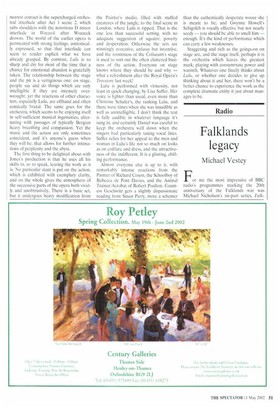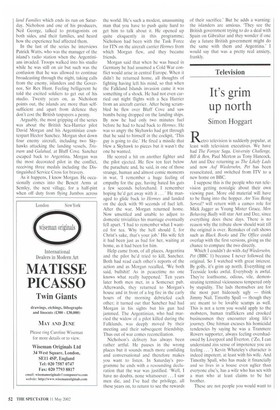Falklands legacy
Michael Vestey
For me the most impressive of BBC radio's programmes marking the 20th anniversary of the Falklands war was Michael Nicholson's six-part series, Falk
land Families which ends its run on Saturday. Nicholson and one of his producers, Neil George, talked to protagonists on both sides, and their families, and heard how the experience had affected them.
In the last of the series he interviews Patrick Watts, who was the manager of the island's radio station when the Argentinians invaded. Troops walked into his studio while he was still on air but such was the confusion that he was allowed to continue broadcasting through the night, taking calls from the enemy, islanders and the Governor, Sir Rex Hunt. Feeling belligerent he told the excited soldiers to get out of his studio. Twenty years on, as Nicholson points out, the islands are more than selfsufficient and apart from defence they don't cost the British taxpayers a penny.
Arguably, the most gripping of the series was about the British Sea-Harrier pilot David Morgan and his Argentinian counterpart Hector Sanchez. Morgan shot down four enemy aircraft, including two Skyhawks attacking the landing vessels, Tristram and Galahad, at Bluff Cove. Sanchez escaped back to Argentina. Morgan was the most decorated pilot in the conflict, receiving three medals including the Distinguished Service Cross for bravery.
As it happens, I know Morgan. He occasionally comes into the Benett Arms at Semley, the next village, for a half-pint when off duty from flying Jumbos across the world. He's such a modest, unassuming man that you have to push quite hard to get him to talk about it. He opened up quite eloquently in this programme; Nicholson had been with the Task Force for ITN on the aircraft carrier Hermes from which Morgan flew, and they became friends.
Morgan said that when he was based in Germany he had assumed a Cold War conflict would arise in central Europe. When it didn't he returned home, all thoughts of fighting having left his mind, so that when the Falkland Islands invasion came it was something of a shock. He had not even carried out night flights with a Sea Harrier from an aircraft carrier. After being scrambled he flew over Bluff Cove and saw bombs being dropped on the landing ships. By now he had only two minutes fuel before he had to head back to Hermes. He was so angry the Skyhawks had got through that he said to himself in the cockpit, 'This guy is going to die.' He fired a missile that blew a Skyhawk to pieces but it wasn't the one he wanted.
He scored a hit on another fighter and the pilot ejected. He flew ten feet below the parachute and, he said, in one of those strange, human and almost comic moments in war, 'I remember a huge feeling of empathy for the guy, having hated his guts a few seconds beforehand. I remember hoping he'd get away with it ... ' He managed to glide back to Hermes and landed on the deck with 90 seconds of fuel left. After the war, Morgan returned home. Now unsettled and unable to adjust to domestic trivialities his marriage eventually fell apart. 'I had to remember what I wanted for tea. Why the hell should 1, for Christ's sake, that's your job.' His wife felt it had been just as bad for her, waiting at home, as it had been for him.
Help came from, of all places, Argentina and the pilot he'd tried to kill, Sanchez. Both had read each other's reports of the action and as Morgan recalled, 'We both said, bullshit! As in peacetime no one knows what really happened.' Ten years later both men met, in a Somerset pub. Afterwards, they returned to Morgan's house and in front of a log fire in the early hours of the morning debriefed each other; it turned out that Sanchez had had Morgan in his sights but his gun had jammed. The Argentinian, who had married the widow of a pilot killed during the Falklands, was deeply moved by their meeting and their subsequent friendship. Thus out of war comes reconciliation.
Nicholson's delivery has always been rather artful. He pauses in the wrong places but it sounds much more confiding and conversational and therefore makes you want to listen. In Saturday's programme he ends with a resounding declaration that the war was justified. 'Well, I have no doubts, none whatsoever. . I saw men die, and I've had the privilege, all these years on, to return to see the rewards of their sacrifice.' But he adds a warning: the islanders are anxious. 'They see the British government trying to do a deal with Spain on Gibraltar and they wonder if one day a future British government might do the same with them and Argentina.' I would say that was a pretty real anxiety, frankly.







































































 Previous page
Previous page